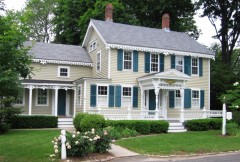
An older house will come down through a testament or mortgage, thus making it invisible on a deed. It is recommended to look at surveyor maps, which could have made the selling price fluctuate according to any extensions in the house, and some proofs of construction will be coupled with the deeds. For those in America, a county courthouse will possess the deed registry, which is indexed by lot and block number or township and range depending on whether the property is urban or rural. That place’s assessor keeps records of the taxable value of the home, which may have been detailed by previous surveyors.
In all cases and places, it also helps to ask any elderly neighbours who are familiar with the area and can offer, if no direct information about the property, then some psycho geographical evidence on who lived nearby. You might even get a cup of tea for your troubles and queries. Previous occupants can be sought if still alive, as they will have good knowledge of the property and may well have researched the history of it as well. Just in case, use a metal detector to see if any trinkets or coins are buried in the garden.